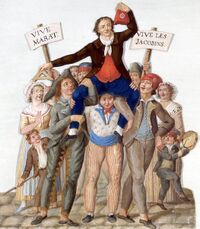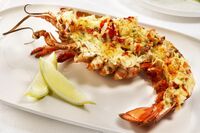Jacobins
The Jacobins were a group of French middle-class agitators who first came to notice during the French Revolution. They advocated a republican form of government. No kings (French or otherwise), no aristocrats and no Catholic Church either. The Jacobins wanted a politcal revolution. Le roi est mort! Would that the casualties had ended at one.
Initially a small minority in the general push for change in France, the Jacobins claimed they represented the real France, but gained a reputation for ruthless politicking. When adversaries emerged, ruthless politicking became ruthless terror. The best-known Jacobin leaders were Georges Danton and Maximilien Robespierre. Jean-Paul Marat is lesser-known, owing to the time he took a sexy bath with a woman who turned out to be an assassin.
In the Club[edit]
The Jacobins' original, milquetoast name — the 'Society of the Friends of the Constitution' — masked their true intentions. They were radical revolutionaries who wanted to go beyond storming fortresses and abusing the monarchy. The Jacobins were anti-religion. They got their more permanent name after ejecting the monks from the Jacobin Convent in Paris. Throwing out bibles and selling-off Christian iconography, the converted monastery became 'The Jacobin Club', a male-only exclusive entertainment for tired revolutionaries after a long day hating everything.
The Jacobins sat in the National Convention with other revolutionaries with a faction known as 'The Mountain' (in French, the Montegards or Mountebacks). They sat on the highest seats in the assembly and wore typical mountaineering gear like helmets and ropes.
The Jacobins opposed the initial attempt to turn France from an absolute monarchy into a constitutional one like the British version. Moderate revolutionaries were outflanked when King Louis XVI allied himself with his fellow despots and tried to flee the country.
March to power[edit]
The Jacobins were allied with the Sans-culottes (Garçons Without Trousers), a mob of ultra-revolutionaries easily whipped up into instant outrage. One man good at getting them to act revoltingly was the journalist Jean-Paul Marat, an avid pamphleteer[1] agitating for total war on the enemies of the revolution, inside and outside France.
The Jacobins' rivals, the Girondists, were also revolutionaries — for Liberty, Equality, and Fraternity clubbing — but not with Equality of fervour. Marat whipped up a crowd and they dragged the Girondists out of the National Convention for being RINOs (Revolutionaries In Name Only). Marat celebrated his success, but then got stabbed underneath the soap dish by an 18th-century Cindy McCain called Charlotte Corday.
The leaders of the Jacobins including Georges Danton and Maximilien Robespierre unleashed The Kraken in a bloody repression of all enemies in September 1793. With their enemies dead or in exile, for the first time a European country was under the rule of secular atheists. Religion was banned. It was year zero. No more A.D., no more seven-day weeks or months and days of the year. Everything was changed. You addressed each other as 'Citizen Renault' or 'Citizen Citroën'.
Eating each other[edit]
Once the Jacobins controlled all the levers of power (especially the lever for the guillotine), their unified government ironically began to exhibit disunity. 'Leftist' Jacobins talked of a social revolution to match the political one. These were the Herbalists, as they spent a lot of time on French weed. The 'moderate' Jacobins noted that France was now winning its war against invaders, and proposed to decapitate dozens rather than thousands.
Finally, the leading Jacobin leader, Maximilien Robespierre, re-unified France by 'doing the chop' more furiously than Jane Fonda in the Owner's Box in Atlanta. The Jacobins became a cult of the Supreme Being; those who had kept their heads, kept their heads, and proclaimed — We are all 'Robespierrists' now.
In July 1794, it was Robespierre's turn to be hoist upon his own petard. The rebel Jacobins called themselves the 'Thermidorians' as they were partial to lobster. They overthrew Robespierre by pinning him down in his seat with boiled pincers and executed him with his colleagues in boiling water. The Sans-culottes were told to grow up and 'buy a pair'. These Boiled Lobster Jacobins tried to put themselves forward as 'peacemakers'. They were born-again but quickly bundled off, driven from office and in some cases, from their own heads, as a warning to others to stay out. A few months later, the Jacobin Club was closed down, though the joint had already emptied out through execution and exile. All the lap dancers were laid off and the bar bill forwarded to England. When the Jacobins and a few stray Herbalists tried to re-open their place of entertainment in 1795, the French government demolished the building with the hardliners still inside.
In summary[edit]
Though the original Jacobins had been so effective in killing each other, their approach to politics lived on. The use of maximalist demands and the use of terror as a way of coercion was much admired by later revolutionaries like Karl Marx, Vladimir Lenin and Mao Zedong. That a core of cranks had so successfully taken over the state caused alarm elsewhere in Europe and the USA. Thomas Jefferson's opponents called him 'The American Jacobin' for his lurid support of the French revolution and the excesses that happened after.
In time, the term Jacobin has used to more broadly describe any opponents of an established order who prefer barricades to ballot boxes. And who doesn't mind seeing them in a good drama, busy plotting and scheming to upset everything?
References[edit]
- ↑ In that respect, he was like his American contemporary, Alexander Hamilton. The sans-culottes thing more resembled Ted Kennedy on a bender in Palm Beach.

